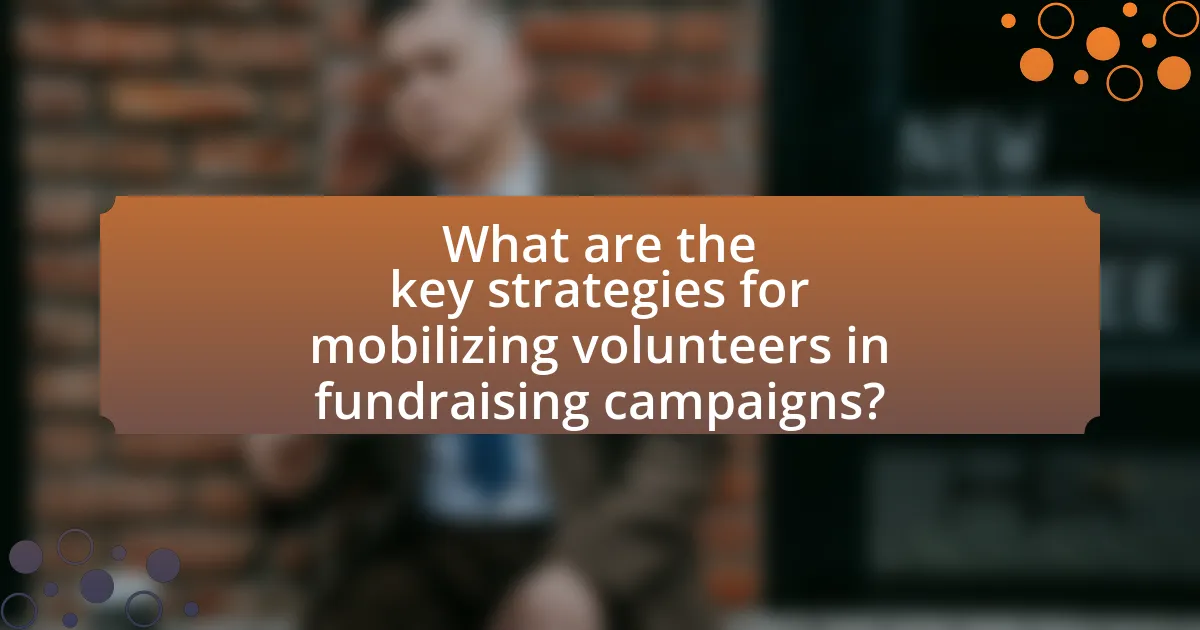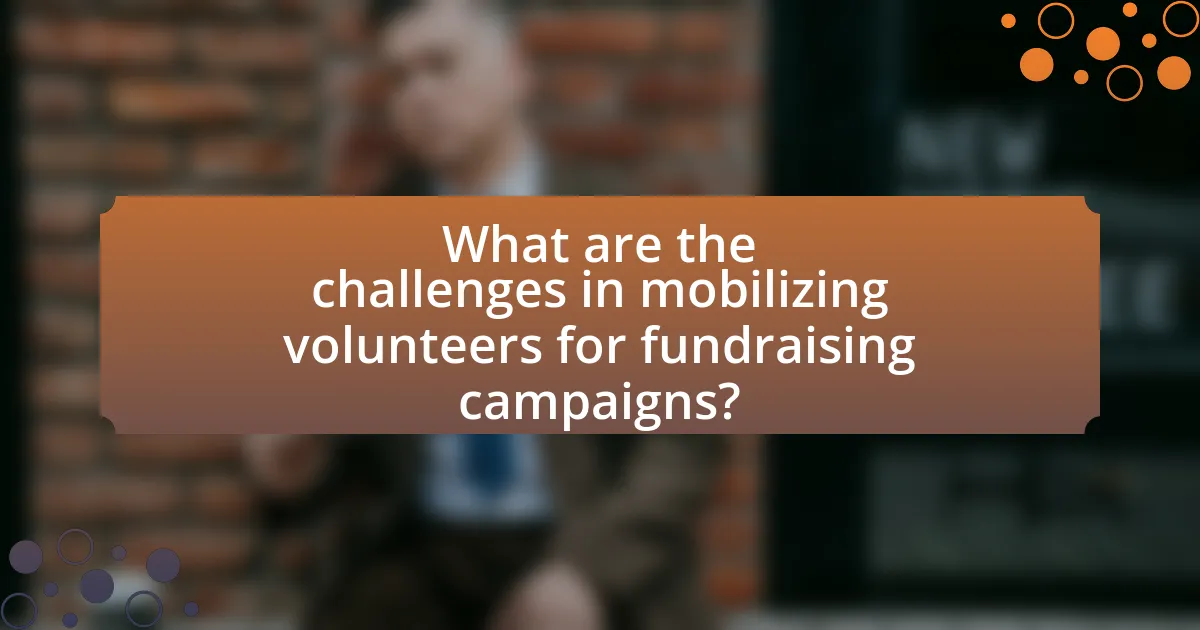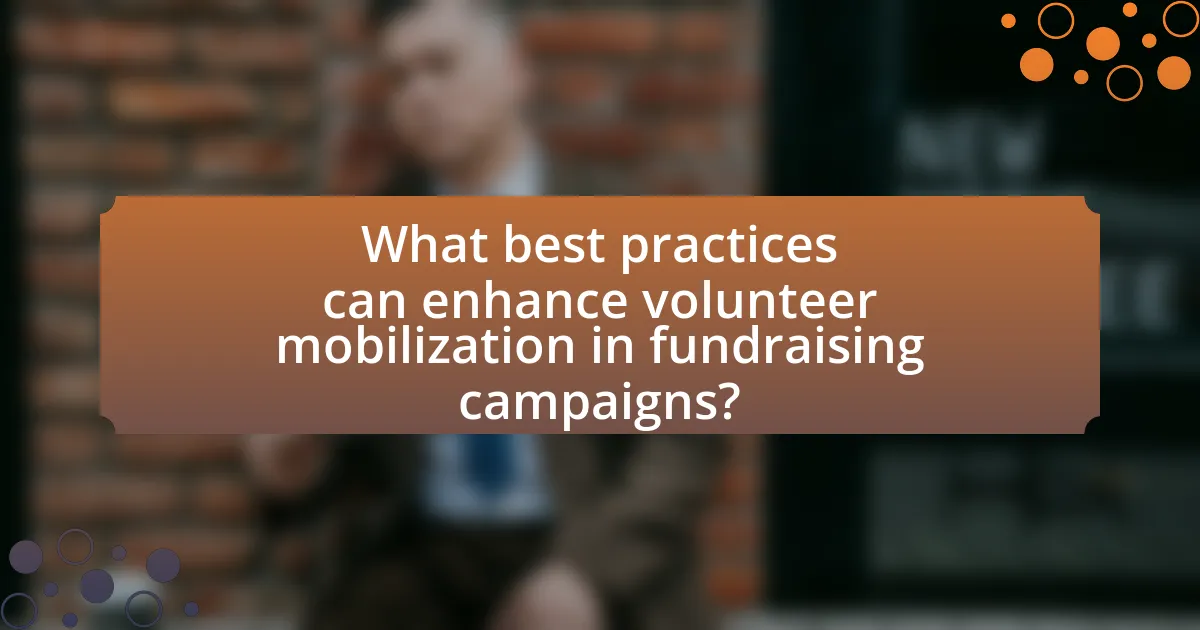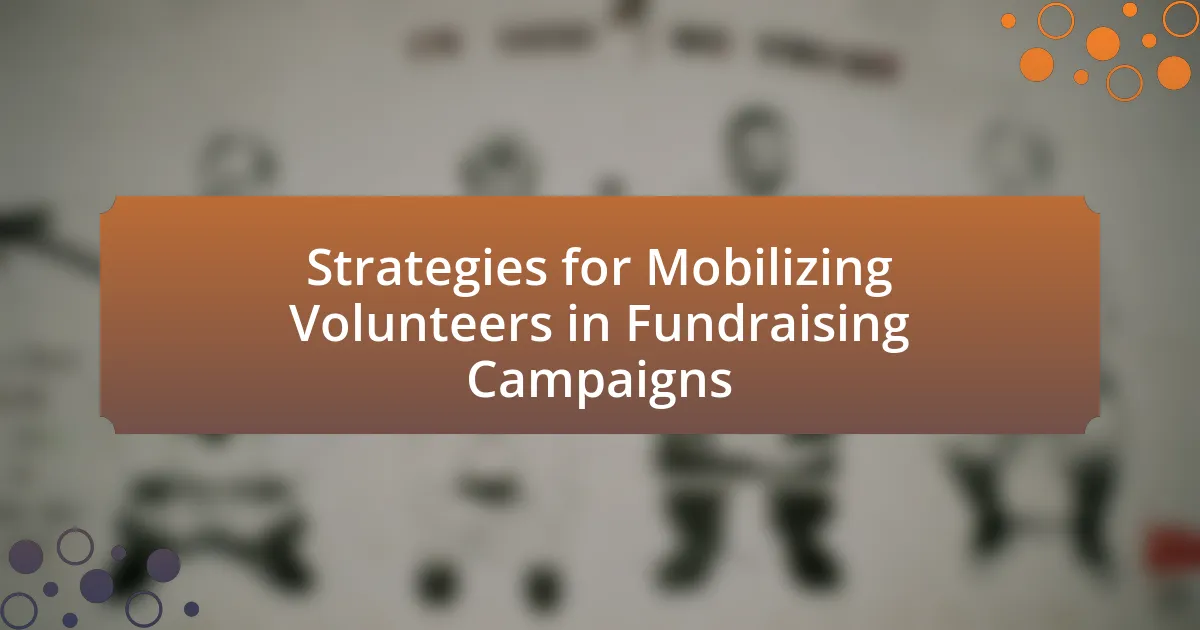The article focuses on strategies for mobilizing volunteers in fundraising campaigns, emphasizing the importance of effective communication, clear role definition, and recognition of contributions. It outlines methods for recruiting volunteers, including leveraging social media and community partnerships, and highlights the significance of volunteer training in enhancing fundraising efficiency. Additionally, the article addresses challenges organizations face in volunteer mobilization, such as recruitment difficulties and volunteer burnout, while providing best practices for creating positive volunteer experiences and maintaining engagement. Overall, it presents a comprehensive overview of how organizations can effectively engage and retain volunteers to maximize fundraising success.

What are the key strategies for mobilizing volunteers in fundraising campaigns?
Key strategies for mobilizing volunteers in fundraising campaigns include effective communication, clear role definition, and recognition of contributions. Effective communication ensures that volunteers understand the campaign’s goals and their specific tasks, fostering engagement and commitment. Clear role definition helps volunteers know what is expected of them, which increases efficiency and satisfaction. Recognition of contributions, whether through public acknowledgment or rewards, motivates volunteers to continue their involvement and encourages others to join. Research indicates that organizations that implement these strategies see a higher retention rate of volunteers and increased fundraising success.
How can organizations effectively recruit volunteers for fundraising efforts?
Organizations can effectively recruit volunteers for fundraising efforts by leveraging targeted outreach strategies and creating engaging volunteer experiences. Utilizing social media platforms, local community events, and partnerships with schools or businesses can help reach potential volunteers. Research indicates that organizations that clearly communicate their mission and the impact of fundraising efforts attract more volunteers; for instance, a study by the Corporation for National and Community Service found that 63 million Americans volunteered in 2017, highlighting the potential pool of individuals willing to contribute to meaningful causes. Additionally, providing training, recognition, and opportunities for skill development can enhance volunteer retention and satisfaction, further supporting fundraising initiatives.
What channels are most effective for volunteer recruitment?
Social media platforms, particularly Facebook and Instagram, are the most effective channels for volunteer recruitment. These platforms allow organizations to reach a broad audience, engage potential volunteers through targeted ads, and share compelling stories that resonate with users. According to a 2021 study by the Corporation for National and Community Service, 63% of volunteers reported that they learned about opportunities through social media, highlighting its significant role in recruitment efforts. Additionally, local community events and partnerships with schools or universities also serve as effective channels, as they foster direct engagement and personal connections, which are crucial for motivating individuals to volunteer.
How can organizations leverage social media to attract volunteers?
Organizations can leverage social media to attract volunteers by creating engaging content that highlights their mission and the impact of volunteer work. By sharing stories, testimonials, and visuals of past volunteer experiences, organizations can foster a sense of community and purpose. Research indicates that 79% of volunteers are motivated by the opportunity to make a difference, which social media can effectively showcase through compelling narratives and calls to action. Additionally, utilizing targeted ads on platforms like Facebook and Instagram can reach specific demographics interested in volunteering, thereby increasing the likelihood of attracting potential volunteers.
What role does volunteer training play in fundraising campaigns?
Volunteer training is essential in fundraising campaigns as it equips volunteers with the necessary skills and knowledge to effectively engage donors and promote the campaign’s objectives. Proper training enhances volunteers’ understanding of the organization’s mission, fundraising goals, and the specific strategies they need to employ, which can lead to increased donor engagement and higher fundraising outcomes. Research indicates that organizations with well-trained volunteers often see a 20-30% increase in fundraising efficiency, demonstrating the direct impact of training on campaign success.
What essential skills should volunteers be trained in?
Volunteers should be trained in communication, teamwork, and fundraising skills. Effective communication enables volunteers to convey messages clearly and engage with donors, while teamwork fosters collaboration and enhances the overall efficiency of fundraising efforts. Additionally, training in fundraising skills equips volunteers with techniques for soliciting donations, understanding donor motivations, and utilizing various fundraising platforms. Research indicates that organizations with well-trained volunteers see a 30% increase in fundraising success, highlighting the importance of these essential skills.
How can organizations create effective training programs for volunteers?
Organizations can create effective training programs for volunteers by conducting a needs assessment to identify specific skills and knowledge required for the tasks at hand. This approach ensures that training is relevant and tailored to the volunteers’ roles, enhancing their effectiveness in fundraising campaigns. Research indicates that organizations that align training with volunteer roles see a 30% increase in engagement and retention rates (Source: Volunteer Management Practices, 2020, by the National Council for Voluntary Organizations). Additionally, incorporating interactive methods such as workshops, role-playing, and real-life scenarios can significantly improve learning outcomes, as active participation has been shown to enhance retention of information by up to 75% (Source: Learning Styles and Strategies, 2019, by the Association for Talent Development). Regular feedback and evaluation of the training program further ensure continuous improvement and adaptation to the evolving needs of both the organization and its volunteers.
Why is volunteer engagement important in fundraising campaigns?
Volunteer engagement is crucial in fundraising campaigns because it enhances resource mobilization and community connection. Engaged volunteers not only contribute their time and skills but also amplify outreach efforts, leading to increased donations and support. According to a study by the Corporation for National and Community Service, organizations that effectively engage volunteers can raise 4-5 times more funds than those that do not utilize volunteers. This statistic underscores the significant impact of volunteer involvement on fundraising success.
How does volunteer engagement impact fundraising success?
Volunteer engagement significantly enhances fundraising success by increasing donor connections and expanding outreach efforts. Engaged volunteers often leverage their networks to promote fundraising initiatives, leading to higher visibility and potential contributions. For instance, a study by the Corporation for National and Community Service found that organizations with active volunteer programs can raise up to 20% more funds than those without. This correlation is attributed to volunteers’ ability to share personal stories and experiences, which resonate with potential donors and foster trust in the organization.
What strategies can enhance volunteer motivation and commitment?
To enhance volunteer motivation and commitment, organizations should implement recognition programs, provide meaningful roles, and foster a sense of community. Recognition programs, such as awards or public acknowledgment, can significantly boost volunteers’ morale and reinforce their contributions, as studies show that recognition increases engagement by up to 60%. Assigning meaningful roles that align with volunteers’ skills and interests ensures they feel valued and invested in the cause, leading to higher retention rates. Additionally, creating a sense of community through team-building activities and regular communication fosters strong relationships among volunteers, which research indicates can enhance commitment levels by promoting a supportive environment.

What are the challenges in mobilizing volunteers for fundraising campaigns?
Mobilizing volunteers for fundraising campaigns faces several challenges, including recruitment difficulties, lack of commitment, and resource constraints. Recruitment can be hindered by competition from other organizations and the limited availability of potential volunteers. Additionally, volunteers may lack commitment due to unclear expectations or insufficient training, leading to high turnover rates. Resource constraints, such as limited funding for outreach and training programs, further complicate the mobilization process. According to a study by the Corporation for National and Community Service, 63 million Americans volunteered in 2017, yet many organizations struggle to engage and retain these individuals effectively.
What common obstacles do organizations face when recruiting volunteers?
Organizations commonly face several obstacles when recruiting volunteers, including a lack of awareness about the organization, limited resources for outreach, and competition from other organizations. A significant challenge is the insufficient visibility of the organization, which can lead to potential volunteers being unaware of available opportunities. Additionally, many organizations struggle with limited marketing budgets and staff, hindering their ability to effectively promote volunteer roles. Furthermore, competition for volunteers is intense, as numerous nonprofits and community groups vie for the same pool of potential volunteers, making it difficult for any single organization to attract and retain volunteers.
How can organizations overcome volunteer recruitment challenges?
Organizations can overcome volunteer recruitment challenges by implementing targeted outreach strategies that engage specific demographics. For instance, utilizing social media platforms can effectively reach younger audiences, as studies show that 79% of people aged 18-29 are active on social media, making it a prime channel for recruitment. Additionally, forming partnerships with local businesses and community organizations can expand reach and credibility, as collaborative efforts often attract more volunteers. Research indicates that organizations with strong community ties see a 30% increase in volunteer engagement. By leveraging these strategies, organizations can enhance their recruitment efforts and build a robust volunteer base.
What strategies can be employed to retain volunteers during campaigns?
To retain volunteers during campaigns, organizations should implement strategies such as providing meaningful recognition, fostering a sense of community, and ensuring clear communication. Recognition can include public acknowledgment of volunteers’ contributions, which has been shown to increase volunteer satisfaction and commitment. Creating a sense of community through team-building activities enhances relationships among volunteers, leading to higher retention rates. Additionally, maintaining clear and consistent communication about campaign goals and volunteer roles helps volunteers feel informed and valued, which is critical for their continued engagement. Research indicates that organizations that prioritize these strategies experience up to a 50% increase in volunteer retention rates compared to those that do not.
How can organizations address volunteer burnout in fundraising efforts?
Organizations can address volunteer burnout in fundraising efforts by implementing regular check-ins and providing adequate support. Regular communication helps to identify stressors and allows volunteers to express their concerns, which can lead to timely interventions. Additionally, offering training and resources equips volunteers with the skills needed to perform their tasks effectively, reducing feelings of overwhelm. Research indicates that organizations that prioritize volunteer well-being see a 30% increase in retention rates, demonstrating the effectiveness of these strategies in maintaining volunteer engagement and enthusiasm.
What signs indicate that volunteers may be experiencing burnout?
Signs that indicate volunteers may be experiencing burnout include decreased motivation, increased absenteeism, emotional exhaustion, and feelings of ineffectiveness. These symptoms manifest when volunteers feel overwhelmed by their responsibilities, leading to disengagement from their tasks. Research shows that emotional exhaustion can result in a 50% increase in turnover rates among volunteers, highlighting the importance of recognizing these signs early to implement supportive measures.
How can organizations implement support systems for volunteers?
Organizations can implement support systems for volunteers by establishing clear communication channels, providing training and resources, and recognizing volunteer contributions. Clear communication ensures that volunteers understand their roles and responsibilities, which can be facilitated through regular updates and feedback mechanisms. Training programs equip volunteers with the necessary skills and knowledge to perform their tasks effectively, enhancing their confidence and performance. Additionally, recognizing and rewarding volunteers fosters a sense of belonging and appreciation, which can lead to increased motivation and retention. Research indicates that organizations with structured support systems see a 30% increase in volunteer satisfaction and engagement, ultimately leading to more successful fundraising campaigns.

What best practices can enhance volunteer mobilization in fundraising campaigns?
Effective communication and clear role definition are best practices that can enhance volunteer mobilization in fundraising campaigns. By providing volunteers with specific tasks and responsibilities, organizations can ensure that each individual understands their contribution to the campaign’s success. Research indicates that organizations that utilize structured onboarding processes and regular updates see a 30% increase in volunteer retention rates, which directly correlates with improved fundraising outcomes. Additionally, fostering a sense of community among volunteers through team-building activities and recognition programs can significantly boost motivation and engagement, leading to more effective mobilization efforts.
How can organizations create a positive volunteer experience?
Organizations can create a positive volunteer experience by providing clear communication, meaningful roles, and recognition. Clear communication ensures that volunteers understand their responsibilities and the impact of their work, which fosters engagement. Meaningful roles align volunteers’ skills and interests with the organization’s needs, enhancing their sense of purpose. Recognition, such as thanking volunteers publicly or providing feedback, reinforces their contributions and encourages continued involvement. Research indicates that organizations that implement these strategies see higher volunteer retention rates and satisfaction levels, as evidenced by a study from the Corporation for National and Community Service, which found that effective volunteer management practices significantly improve volunteer experiences.
What elements contribute to a rewarding volunteer experience?
A rewarding volunteer experience is primarily influenced by meaningful engagement, clear communication, and recognition of contributions. Meaningful engagement occurs when volunteers feel their work has a significant impact on the community or cause, which enhances their motivation and satisfaction. Clear communication ensures that volunteers understand their roles, expectations, and the overall mission, fostering a sense of belonging and purpose. Recognition of contributions, whether through verbal appreciation or formal awards, reinforces volunteers’ value and encourages continued participation. Research indicates that organizations that implement these elements see higher volunteer retention rates and increased overall satisfaction, as evidenced by a study from the Corporation for National and Community Service, which found that volunteers who feel appreciated are more likely to return for future opportunities.
How can feedback from volunteers improve future campaigns?
Feedback from volunteers can significantly enhance future campaigns by providing insights into their experiences and suggestions for improvement. This feedback allows organizations to identify strengths and weaknesses in their campaign strategies, ensuring that future efforts are more effective and aligned with volunteer expectations. For instance, a study by the Nonprofit Volunteer Management Network found that organizations that actively sought and implemented volunteer feedback saw a 30% increase in volunteer retention rates, demonstrating the direct impact of incorporating volunteer perspectives on campaign success.
What innovative approaches can be used to mobilize volunteers effectively?
Innovative approaches to mobilize volunteers effectively include leveraging technology, creating engaging social media campaigns, and implementing gamification strategies. Technology platforms, such as volunteer management software, streamline the recruitment and coordination of volunteers, making it easier for organizations to connect with potential helpers. Engaging social media campaigns can raise awareness and attract volunteers by showcasing the impact of their contributions, as evidenced by organizations like Habitat for Humanity, which effectively uses platforms to highlight volunteer stories and successes. Additionally, gamification strategies, such as reward systems or friendly competitions, can motivate volunteers by making participation more enjoyable and rewarding, as demonstrated by initiatives that track volunteer hours and offer recognition for milestones achieved.
How can technology be utilized to streamline volunteer coordination?
Technology can be utilized to streamline volunteer coordination by implementing dedicated platforms that facilitate communication, scheduling, and task management. These platforms, such as VolunteerMatch and SignUpGenius, allow organizations to efficiently manage volunteer sign-ups, track hours, and communicate updates in real-time. For instance, a study by the Corporation for National and Community Service found that organizations using technology for volunteer management reported a 30% increase in volunteer retention rates. This demonstrates that effective use of technology not only simplifies coordination but also enhances volunteer engagement and commitment.
What role do partnerships play in enhancing volunteer mobilization?
Partnerships play a crucial role in enhancing volunteer mobilization by expanding outreach and resources. Collaborating organizations can leverage each other’s networks, increasing visibility and attracting a diverse pool of volunteers. For instance, a study by the Corporation for National and Community Service found that organizations that partnered with local businesses and community groups saw a 30% increase in volunteer participation compared to those that operated independently. This synergy not only amplifies recruitment efforts but also fosters a sense of community ownership and shared purpose, motivating individuals to engage in volunteer activities.
What practical tips can organizations implement for successful volunteer mobilization?
Organizations can implement clear communication strategies to ensure successful volunteer mobilization. By providing detailed information about roles, expectations, and the impact of their contributions, organizations can enhance volunteer engagement. Research indicates that organizations with structured onboarding processes see a 50% increase in volunteer retention rates, highlighting the importance of clarity and support in volunteer management. Additionally, leveraging social media platforms for outreach can expand the volunteer base, as studies show that 70% of volunteers are motivated by social connections and community involvement.
